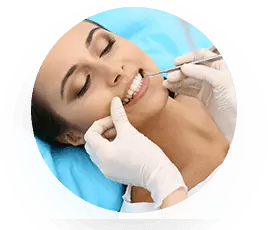MENUMENU
Have you skipped visiting the dentist because you're worried about how much it costs? Your oral health is important, so consider finding affordable dental insurance so you can safeguard your oral health and your overall well-being.
Keep reading to understand everything you should know about dental insurance, including the different types, what it covers, and the benefits it grants your overall health.
Your teeth are an important part of your body. They help you eat food, speak properly, and maintain good self-esteem.
However, despite the importance of oral health, Statista.com reports that only 66% of adults visit the dentist in any given year. The same report indicates a person's likelihood of visiting the dentist strongly correlates with their level of income. Access to affordable oral care is an important issue.
Thankfully, with competitive dental insurance rates, you can maintain your dental wellness and keep a higher overall quality of life.



You can choose from among several types of dental insurance programs.
These programs don't restrict reimbursement based on the category of your treatment. Instead, they pay you a predetermined percentage of your total dental care costs.
An advantage of this type of insurance is that you can receive at least partial coverage for treatments that other programs might not cover. It also encourages you to work with your dentist to determine the best combination of care and affordability.
Under a UCR program, you can visit any dentist regardless of network. These plans pay a certain percentage of either the dentist's fee or their UCR limit as established under your contract with the payer. These plans lack regulation, so whether you find an affordable rate usually depends on your location.
These programs are easy to understand because they provide a complete list of dental procedures they cover, as well as the exact dollar amount included in the coverage. You'll always know the amount the program pays, regardless of how much the dentist charges.
For example, if the program covers routine procedures up to $100, if you use a dentist that charges $125, you'll pay the difference ($25). However, if you find a dentist that charges $100 or less, your insurance will cover all the costs.
Under a capitation program, the insurance pays the dentist a set amount every month for each enrolled member. In return, the dentist provides certain routine procedures at no cost to you. For others, you'll have an affordable copay.
The type of your dental insurance plays an important role in your coverage and cost.
Programs with a PPO use in-network and out-of-network providers. While you may have the option to visit an oral health professional outside your network, you'll pay higher copays or experience certain exclusions.
With a DHMO, you'll contribute a small copay when you visit an in-network provider, or may even receive some services for free. If you visit an out-of-network dentist, you'll likely pay full price for their services.
Medicare is health insurance for people age 65 and older or for those with other qualifying conditions, such as a disability. Each type of Medicare handles dental insurance differently, but if you qualify for Medicare, you likely have some form of dental coverage.
If you're interested in dental insurance, you're probably wondering what it covers. While it focuses on preventive care, you'll still have coverage for the most important treatments and procedures.
Most dental insurance plans focus on preventive care, so you're most likely to have full coverage for these procedures. Preventive care includes:
This type of care focuses on addressing minor to moderate issues with your teeth, such as cavities. This care category often includes the following procedures:
Major dental care includes more invasive or surgical dental procedures you require to restore your dental hygiene to working order. Covered major care procedures may include:
If you have full-coverage dental care, it may cover limited orthodontic care, including braces, aligners, and retainers. However, the coverage usually only applies to children.
While a dental insurance plan is great for maintaining your oral health, it won't cover elective procedures or pre-existing conditions. In general, most dental insurance plans won't cover the following:
No matter what level of insurance coverage you purchase, you should still remember it comes with exclusions. Examine your policy closely to determine specifics like:
What benefits does dental insurance have for your oral health and beyond?
If you already care for your mouth with regular brushing, flossing, and mouthwash, semi-annual dental cleanings add a higher level of protection you can't receive at home. For example, fluoride treatments strengthen your teeth against cavities and can even repair weakening tooth enamel. Even with the best oral hygiene practices, you can still develop cavities without professional dental care.
If you don't have proper oral hygiene, adequate dental insurance becomes even more important, but you'll likely focus more on treatment rather than prevention. It's never too late to start practicing good hygiene, so help your dentist care for your teeth by improving your brushing, flossing, and mouthwash routine.
Even if you practice proper care for your teeth, accidents and emergencies can still happen. Whether you're flush with cash or living paycheck to paycheck, these dental emergencies can threaten your financial stability and destroy your goals.
When you purchase health insurance, you're investing in protecting your teeth and your financial future. Even if a dental emergency never happens, you still get great dental care that keeps your smile looking great for an affordable price.
Don't underestimate the power of a beautiful smile to increase your self-esteem. Good self-esteem can help you stay confident and seize opportunities that make you successful in life. It also helps you make friends and find new relationships, which further enrich your life.
You can't overlook the connection between dental health and overall health. One of the most common oral health complications is gingivitis. According to the Centers for Disease Control, nearly half of all adults over the age of 30 have some form of periodontal (gum) disease.
The bacteria that cause gum disease can spread to the rest of your body. According to a review by Dr. Prasad Dhadse et al., gum disease can increase your chances of heart disease by up to 20%. Research suggests it can also increase your chances for the following conditions:
Dental insurance is an essential investment in protecting your overall health.
With increased confidence in your overall health and protection for your financial future, you can have priceless peace of mind. With your oral health no longer a concern in the back of your mind, you'll have less stress and can focus on enjoying things that make you happy.
So, is dental insurance worth the cost? When you consider all the benefits and the fact that you can compare prices to find the most competitive rates, dental insurance is an essential investment. If you experience a major dental condition, you'll feel thankful for having coverage.
If you want to care for your oral health, you need the best dental insurance for a competitive price. At Insurdinary, you can compare plans and find the best balance of coverage you need for a price you can afford.
Find dental insurance today through Insurdinary, or contact a team member if you have questions.